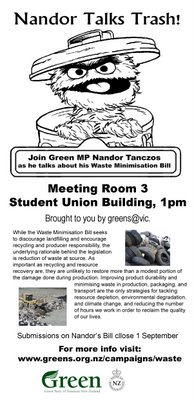Wednesday, July 12, 2006
Waste.

Waste is an important environmental issue, and if there were international awards for producing it – we’d be winners. Every day New Zealanders throw out ten million kilograms of it into landfills or burn it; producing a massive problem that has often been considered, ‘out of sight out of mind.’ The problem is not just where it goes – but also how much of it we are producing.
There are currently ninety landfill sites operating in
Burying our waste is not a solution and we can’t keep hoping it will go away. It won’t. A waste free society is essential to the well-being of people and the integrity and sustainability of the biosphere. Natural ecosystems are self sustaining and generate no waste. Humans form part of the ecosystem and while we access resources from our environment, we have a responsibility to return only those things that can be absorbed without detriment. Waste does not have to be an inevitable part of a modern economyl.
Green Party MP Nandor Tanczos has recently introduced the waste Minimisation Bill that would see the development of a national waste minimisation framework “with teeth” to enforce its implementation. The Bill contains a raft of changes intended to reduce the amount of waste created as well as promoting reuse and recycling whenever possible. Landfill waste levies would be introduced to help pay for a variety of measures including public education about recycling.
Minister for the Environment David Benson Pope has labelled the Bill, “…excessively detailed and prescriptive,” however the Labour Party has supported sending it on to the select committee; who have called for submissions with a deadline of August 4.
Currently waste issues are dealt with under the 2002 NZ Waste Strategy which has lots of good ideas but has failed to decrease the total amount of waste being sent to landfill because it is purely voluntary. Nandor’s Bill would see producers take responsibility for their products at the end of their life and waste generated in their manufacture; would see a levy put on waste going to landfills; would enables bans on landfilling of materials where there is already capacity to reuse, recycle or compost; and would set up a central body to oversee waste minimisation.
Introducing extended producer responsibility is an important step in the right direction to tackle our waste problem. Businesses which produce or import goods should bear the main responsibility for any waste associated with the goods – in their manufacture, packaging and use, and at the end of the goods’ lives. This way, producers would be encouraged to minimise and design out waste and to make reusing or recycling easier. For example today, Vodafone and Telecom accept used phones back and Hewlett Packard, Dell and IBM take back old computer equipment.
Tyre Track, in its first 18 months of operation disposed or reused 1.3 million old tyres, still every year we are disposing of 4 million old tyres. This principle of producer responsibility is essential to creating a sustainable economy; where less waste means less inefficient and expensive use of resources.
To find out more information about Nandor's Bill visit www.greens.org.nz/campaigns/waste and Nandor will be up at Vic talking about waste in the student union building, meeting room 3, at 1pm Thursday 20 July as part of environment week.


